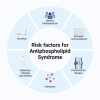Antiphospholipid syndrome in pregnancy: a comprehensive literature review
- PMID: 40128683
- PMCID: PMC11934569
- DOI: 10.1186/s12884-025-07471-w
Antiphospholipid syndrome in pregnancy: a comprehensive literature review
Abstract
Background: Antiphospholipid syndrome (APS) is an autoimmune disorder associated with thrombotic events and adverse obstetric outcomes, particularly in its obstetric form (OAPS). Affecting approximately 0.5% of the population, APS is a leading contributor to recurrent pregnancy loss (RPL), preeclampsia (PE), and fetal growth restriction ((FGR). Despite advancements in understanding its pathophysiology and management, optimal treatment strategies for APS in pregnancy remain challenging and require systematic evaluation. This review synthesizes current evidence on APS mechanisms, diagnostic criteria, and therapeutic interventions, with a focus on maternal and fetal outcomes in OAPS.
Methods: A comprehensive search of PubMed, was conducted to identify studies exploring APS pathogenesis, diagnostic standards, and treatment efficacy in obstetric settings. Inclusion criteria prioritized randomized controlled trials, cohort studies, and systematic reviews with a clear focus on APS and pregnancy.
Results: The review confirmed that APS current accepted pathogenesis is governed by a "two-hit" model, where antiphospholipid antibodies (aPLs) initiate endothelial damage, culminating in thrombosis and placental insufficiency. Epidemiological analysis underscores the prevalence and severity of APS in obstetric contexts, with lupus anticoagulant (LA) emerging as a significant predictor of adverse outcomes. Evidence supports the use of low-dose aspirin (LDA) and heparin to reduce miscarriage rates, while adjunctive treatments, such as hydroxychloroquine (HCQ), have shown promise in improving live birth rates and reducing preterm delivery in high-risk cases. Emerging therapies, including tumoral necrosis factor (TNF-alpha) inhibitors and nitric oxide modulators, may offer additional benefits in refractory cases.
Conclusion: APS remains a critical determinant of adverse pregnancy outcomes, necessitating precise diagnostic criteria and tailored management approaches. This systematic review emphasizes the importance of individualized therapeutic regimens to optimize maternal and fetal health in OAPS and highlights areas for future research, particularly regarding novel pharmacological approaches. Further studies are essential to refine treatment protocols and improve clinical guidelines for managing APS in pregnancy.
Keywords: Antiphospholipid syndrome (APS); Fetal growth restriction (FGR); Hydroxychloroquine (HCQ); Low-dose aspirin (LDA); Obstetric APS (OAPS); Pregnancy complications.
© 2025. The Author(s).
Conflict of interest statement
Declarations. Ethics approval and consent to participate: The study was conducted in accordance with the Declaration of Helsinki and approved by the Institutional Review Board (or Ethics Committee) of the University of Oradea. Consent for publication: Informed consent was not required for this study, as it is a systematic review that analyzes data from previously published research rather than involving direct interaction with human participants. Competing interests: The authors declare no competing interests.
Figures
References
-
- Rodrigues VO, Soligo A, Pannain GD. Antiphospholipid antibody syndrome and infertility. Rev Bras Ginecol Obstet. 2019;41(10):621–7. - PubMed
-
- Muñoz Muñoz C, Ahmed K, Thomas M, Cohen H, Alijotas-Reig J, Giles I. Comparing pregnancy outcomes in patients with criteria and non-criteria autoimmune disease: A systematic review. Lupus. 2022;31(1):5–18. - PubMed
-
- Chaturvedi S, Braunstein EM, Yuan X, Chen H, Alluri RK, Streiff MB, Petri M, Crowther M, McCrae KR, Brodsky RA. Rare germline mutations in complement regulatory genes make the antiphospholipid syndrome catastrophic. Blood. 2019;134:4. - PubMed
Publication types
MeSH terms
Substances
Grants and funding
LinkOut - more resources
Full Text Sources
Medical
Miscellaneous




